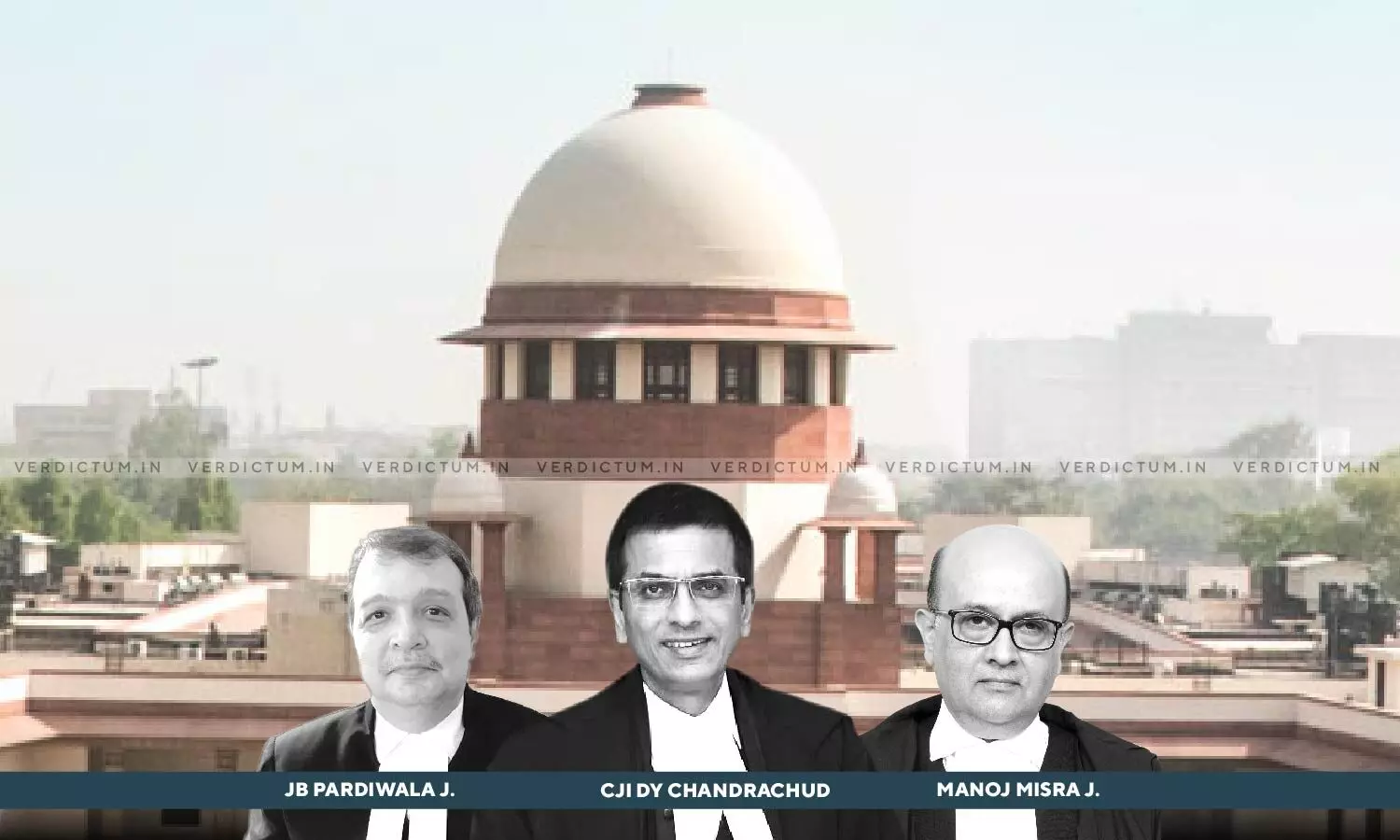
Legislature Can Only Abdicate Subsidiary Or Ancillary Legislative Functions To Delegated Authority After Enunciating Policy & Principles For Guidance: SC
 |
|The Supreme Court reiterated that the legislature can only abdicate subsidiary or ancillary legislative functions to delegated authority after enunciating policy and principles for guidance.
The Court addressed the non-compliance with accessibility standards for persons with disabilities (PWDs) in responses by States and Union Territories regarding the Rights of Persons with Disabilities Act, 2016 (RPWD Act). The case originates from a 2005 writ petition filed by a visually challenged Petitioner, calling for better safety and accessibility in public spaces, including public transport and other essential facilities for persons with disabilities.
The Bench of Chief Justice D.Y. Chandrachud, Justice J.B. Pardiwala, and Justice Manoj Misra observed, "It is trite law that the legislature cannot abdicate essential legislative functions to the delegated authority. The legislature can entrust subsidiary or ancillary legislation to the delegate. However, before such delegation, the legislature should enunciate the policy and the principles for the guidance of the delegated authority. As a corollary, the delegated authority must carry out its rule-making functions within the framework of the law. The delegated legislation must be consistent with the law under which it is made and cannot go beyond the limits of policy and standards laid down in the law.”
Senior Advocate Colin Gonsalves represented the Petitioner, while Additional Solicitor General Vikramjit Banerjee and K.N. Natraj appeared for the Respondents.
The Court in its previous judgment in 2017, set out eleven action points that mandated compliance with accessibility standards for government buildings, railways, airports, and transportation carriers. However, with many states and union territories either failing to respond or providing insufficient information, the Court observed a delay in fulfilling these mandated requirements. The Court appointed the Centre for Disability Studies (CDS) at NALSAR University of Law to prepare a report on accessibility standards across various sectors, including government buildings, public transport, digital spaces, and court facilities.
In addition to reporting on inadequate accessibility measures in various spheres, NALSAR-CDS reported that there was an inconsistency in the legal framework at the root of the slow progress. The report stated that while the RPWD Act created a mechanism for mandatory compliance with a set of non-negotiable accessibility rules, the Right of Persons with Disabilities Rules, 2017 (RPWD Rules) created a mechanism which only prescribed self-regulatory guidelines.
Therefore, the report stated that Rule 15 of the RPWD Rules, which contains the accessibility standards, was ultra vires the RPWD Act. Further, it was contended that the situation on the ground revealed that the absence of non-negotiable rules and excessive reliance on guidelines compromise the effective realisation of accessibility rights.
The Supreme Court listed the following principles of accessibility to be considered while carrying out the exercise of segregating the non-negotiable rules from the expansive guidelines already prescribed in Rule 15:
- Universal Design: The rules should prioritize universal design principles, making spaces and services usable by all individuals to the greatest extent possible, without requiring adaptations or specialized design;
- Comprehensive Inclusion Across Disabilities: Rules should cover a wide range of disabilities including physical, sensory, intellectual, and psychosocial disabilities. This includes provisions for specific conditions such as autism, cerebral palsy, intellectual disabilities, psychosocial disabilities, sickle cell disease, and ichthyosis;
- Assistive Technology Integration: Mandating the integration of assistive and adaptive technologies, such as screen readers, audio descriptions, and accessible digital interfaces, to ensure digital and informational accessibility across public and private platforms;
- Ongoing Stakeholder Consultation: This process should involve continuous consultation with persons with disabilities and advocacy organizations to incorporate lived experiences and practical insights.
“Rule 15, in its current form, does not provide for non-negotiable compulsory standards, but only persuasive guidelines. While the intention of the RPWD Act to use compulsion is clear, the RPWD Rules have transformed into selfregulation by way of delegated legislation. The absence of compulsion in the Rules is contrary to the intent of the RPWD Act,” the Bench stated.
Consequently, the Court held, “In view of the above, we hold that several of the guidelines prescribed in Rule 15, appear to be recommendatory guidelines, under the garb of mandatory rules. Rule 15(1) is thus ultra vires the scheme and legislative intent of the RPWD Act which creates a mechanism for mandatory compliance. Creating a minimum floor of accessibility cannot be left to the altar of progressive realization.”
Accordingly, the Supreme Court adjourned the Writ Petitions to March 7, 2025 and directed the Union government to delineate mandatory rules.
Cause Title: Rajive Raturi v. Union of India & Ors. (Neutral Citation: 2024 INSC 858)
Appearance:
Petitioner: Senior Advocate Colin Gonsalves; Advocates Rajanmani and Ali Qambar Zaidi; AOR Satya Mitra and Jyoti Mendiratta
Respondents: Additional Solicitor General Vikramjit Banerjee and K.N. Natraj; Deputy Advocate General Jatinder Kumar Sethi; Senior Advocates Nachiketa Joshi, Wasim Quadri, Lenin Singh Hijam and Maninder Singh; AOR N. Visakamurthy, Mukesh Kumar Maroria, Shreekant Neelappa Terdal, Susmita Lal, Gopal Prasad, Sanjay Kumar Visen, Guntur Prabhakar, M. T. George, V. K. Verma, Chanchal Kumar Ganguli, Raj Singh Rana, Nishe Rajen Shonker, V. N. Raghupathy, Diksha Rai, Amrish Kumar, K. Enatoli Sema, Nishant Ramakantrao Katneshwarkar, Shibashish Misra, Anil Nag, Jatinder Kumar Bhatia, et al; Advocates Siddharth Sinha, Sunita Sharma, Abhishek Atrey, Nachiketa Joshi, R.r Rajesh, Wasim Qadri, Akshay Amritanshu, Kanu Agrawal, Indira Bhakar, Mukesh Kumar Verma, Bhuvan Kapoor, Piyush Beriwal, Shashwat Parihar, Harish Pandey, Rajesh Singh Chauhan, Krishan Kant Dubey, Piyush Vyas, Purvat Wali, Amit Kumar Singh, Chubalemla Chang, Prang Newmai, Omkar Deshpande, Siddharth Dharmadhikari, Sourav Singh, et al